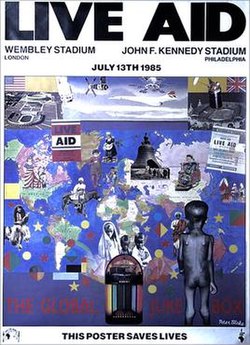
Back የቀጥታ እርዳታ Amharic Live Aid AST Лайв ейд Bulgarian Live Aid BS Live Aid Catalan Live Aid Czech Live Aid Danish Live Aid German Live Aid Greek Live Aid Esperanto
| Live Aid | |
|---|---|
 Official Live Aid poster featuring artwork by Peter Blake | |
| Genre | Pop Rock |
| Dates | 13 July 1985 |
| Location(s) |
|
| Founders | Bob Geldof Midge Ure |
| Attendance | 72,000 (London) 89,484 (Philadelphia) |
Live Aid was a two-venue benefit concert and music-based fundraising initiative held on Saturday, 13 July 1985. The event was organised by Bob Geldof and Midge Ure to raise further funds for relief of the 1983–1985 famine in Ethiopia, a movement that started with the release of the successful charity single "Do They Know It's Christmas?" in December 1984. Billed as the "global jukebox", Live Aid was held simultaneously at Wembley Stadium in London, and John F. Kennedy Stadium in Philadelphia.[1][2]
On the same day, concerts inspired by the initiative were held in other countries, such as the Soviet Union, Canada, Japan, Yugoslavia, Austria, Australia, and West Germany. It was one of the largest satellite link-ups and television broadcasts of all time. An estimated audience of 1.9 billion people in 150 nations watched the live broadcast, nearly 40 percent of the world population.[3][4]
The impact of Live Aid on famine relief has been debated for years. One aid relief worker stated that following the publicity generated by the concert, "humanitarian concern is now at the centre of foreign policy" for Western governments.[5] Geldof has said, "We took an issue that was nowhere on the political agenda and, through the lingua franca of the planet – which is not English but rock 'n' roll – we were able to address the intellectual absurdity and the moral repulsion of people dying of want in a world of surplus."[6] In another interview he stated that Live Aid "created something permanent and self-sustaining" but also asked why Africa is getting poorer.[5]
The organisers of Live Aid tried to run aid efforts directly, channelling millions of pounds to NGOs in Ethiopia. It has been alleged that much of this went to the Ethiopian government of Mengistu Haile Mariam – a regime the UK Prime Minister Margaret Thatcher opposed[7] – and it is also alleged some funds were spent on guns.[5][8] Although the BBC World Service programme Assignment reported in March 2010 that the funds had been diverted, the BBC Editorial Complaints Unit later found "that there was no evidence to support such statements".[9] Brian Barder, British Ambassador to Ethiopia from 1982 to 1986, wrote on his website that "the diversion of aid related only to the tiny proportion that was supplied by some NGOs to rebel-held areas".[10]
- ^ Live Aid on Bob Geldof's official site Archived 5 February 2011 at the Wayback Machine
- ^ "Billboard Boxscore". Billboard. 27 July 1985. Retrieved 6 March 2020.
- ^ Cite error: The named reference
CNNwas invoked but never defined (see the help page). - ^ World Population Prospects: The 2017 Revision Archived 19 September 2016 at the Wayback Machine. United Nations, Department of Economic and Social Affairs. Retrieved 7 June 2018.
- ^ a b c "Cruel to be kind?". The Guardian. Retrieved 31 March 2019.
- ^ "Live Aid index: Bob Geldof". The Guardian. Retrieved 14 June 2019.
- ^ "Margaret Thatcher demanded the UK find ways to 'destabilise' Ethiopian regime in power during 1984 famine". The Independent. Retrieved 10 April 2019.
- ^ "Live Aid: The Terrible Truth". Spin. 13 July 2015. Retrieved 30 March 2019.
- ^ "BBC apologises over Band Aid money reports". BBC. Retrieved 19 July 2020.
- ^ "Ethiopia famine relief aid: misinterpreted allegations out of control". Barder.com. Retrieved 18 July 2020.